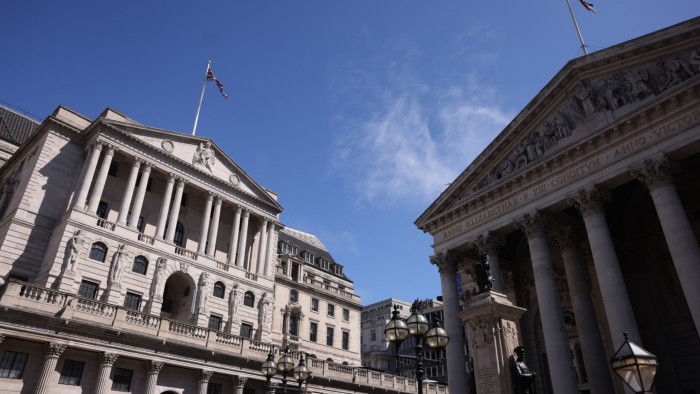Stay informed with free updates
Simply sign up to the UK banks myFT Digest — delivered directly to your inbox.
The Bank of England has announced a one-year delay to key provisions in post-financial crisis banking reforms as part of a raft of changes designed to ease capital requirements for UK lenders.
The central bank said on Tuesday it would delay from 2027 to 2028 the application of the part of the so-called Basel III package that applies to how investment banks calculate capital requirements for wholesale trading activities to allow more time to see how the US applies them.
The delay, which comes only weeks after the EU’s decision to push back its introduction of the trading book rules by a year until 2027, adds to uncertainty over the implementation of the rules that were agreed in the wake of the 2008 financial crisis.
The Basel III regime was first drawn up more than a decade ago to increase the amount of equity available to absorb stress in banks, and to avoid a repeat of the state bailouts that followed the crisis.
The US has already watered down plans for applying its version of the rules — known as Basel Endgame — after heavy lobbying by the banking sector.
UK banks will still apply about 90 per cent of the Basel III reforms — including a simplified form of the rules for smaller lenders — from the start of 2027, the BoE said.
But it added that a delay to the rules on how banks use internal models to calculate market risk in their trading books would allow “time for greater clarity to emerge in other jurisdictions on their own implementation of the aspects most relevant for cross-border activities”.
The BoE said the “fundamental review of the trading book” rules would be simplified by adding flexibility on how banks calculate capital requirements for investments in funds and on areas of complex risks.
The bank also announced several changes to rules for small- and mid-sized banks on Tuesday, including making it easier for them to compete in the mortgage market by removing hurdles on the use of internal models that will lower capital requirements on home loans.
The proposal adds to other measures designed to allow British banks to take extra risk by granting more home loans to people with lower incomes. They are set to be hailed by chancellor Rachel Reeves in her Mansion House speech on Tuesday evening as supporting thousands more first-time home buyers.
The central bank bowed to pressure from the sector to lift the threshold that determines when smaller banks have to start raising expensive loss-absorbing debt, easing pressure on fast-growing digital lenders.
Banks will only need to raise the debt known as MREL — minimum requirement for own funds and eligible liabilities — once they have assets of £25bn to £40bn, up from the current threshold of £15bn-£25bn. The criteria will be adjusted every three years to take account of the pace of economic growth.
Nigel Terrington, chief executive of specialist buy-to-let mortgage lender Paragon, welcomed the change as “a positive move and something we have championed over many years”.
It “provides many mid-tier banks with the capacity to grow without the risk of being drawn into a regime intended for systemically important firms”, he added.
In another shift to lighten the regulatory burden on mid-sized lenders, the BoE said the level of retail deposits that triggers when they have to submit detailed plans for how to wind themselves up in a crisis was being raised from £50bn to £100bn.
Sam Woods, the BoE’s deputy governor for prudential regulation, said the changes would “bring in a simpler regime for smaller banks, make it easier for mid-sized banks to scale up in the mortgage market, and allow an extra year for part of the implementation of new investment banking rules”.



